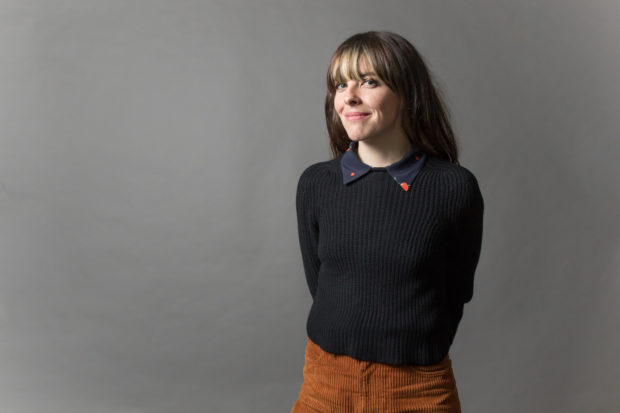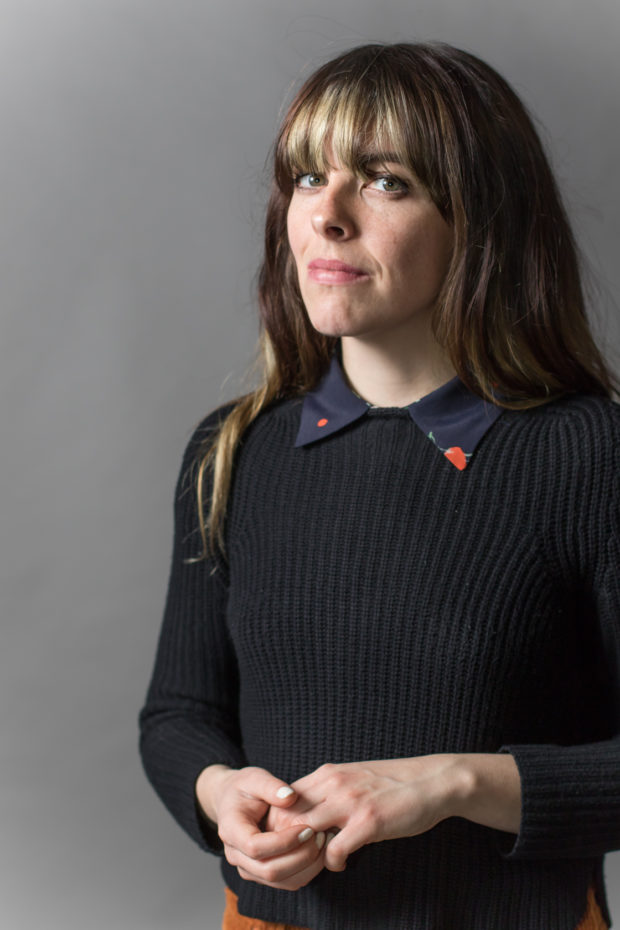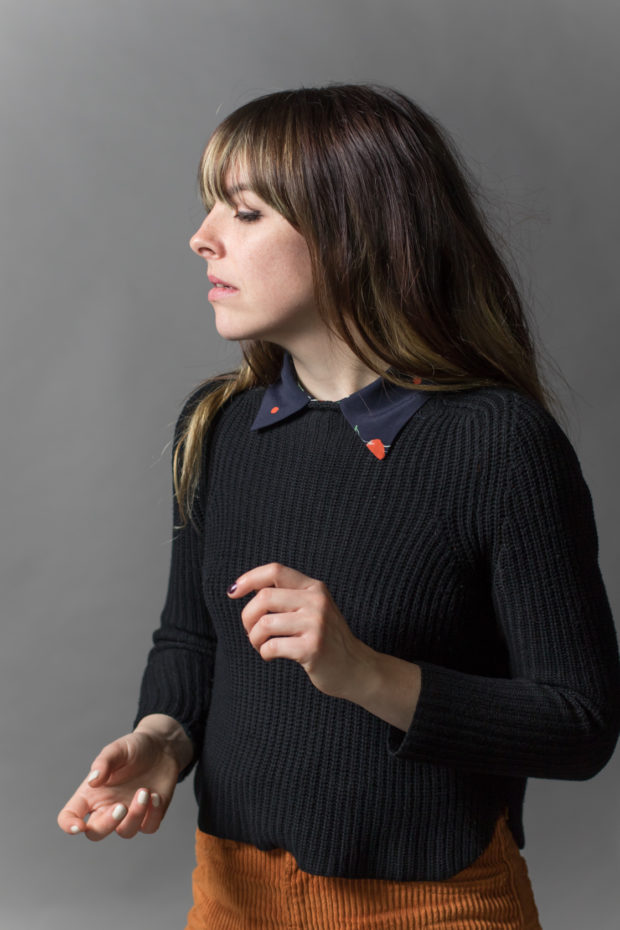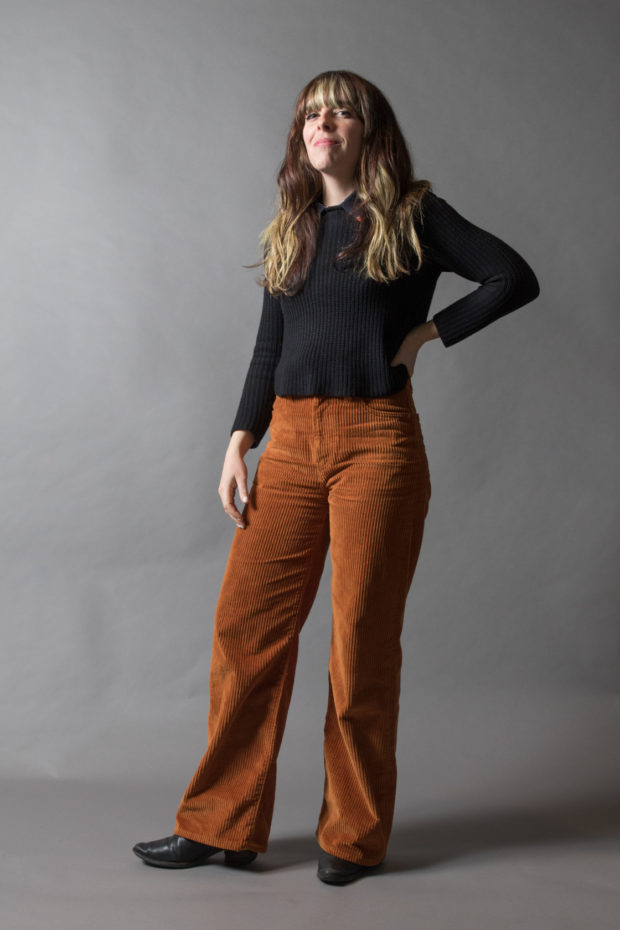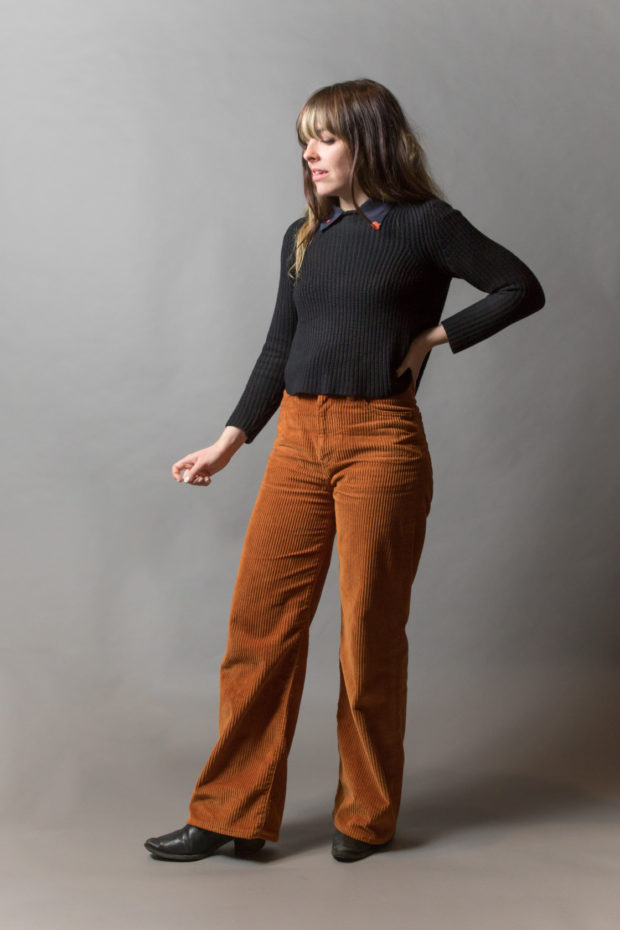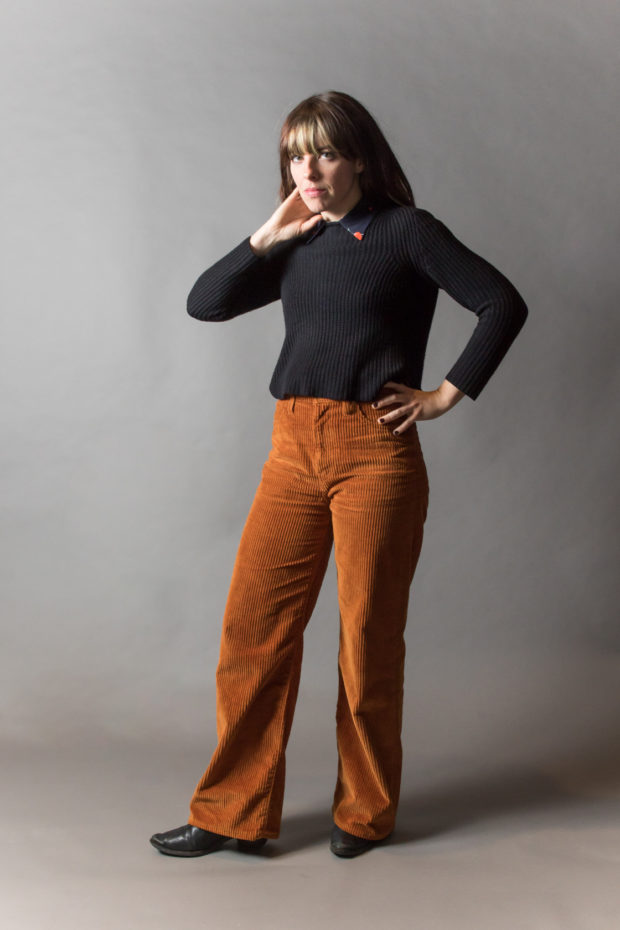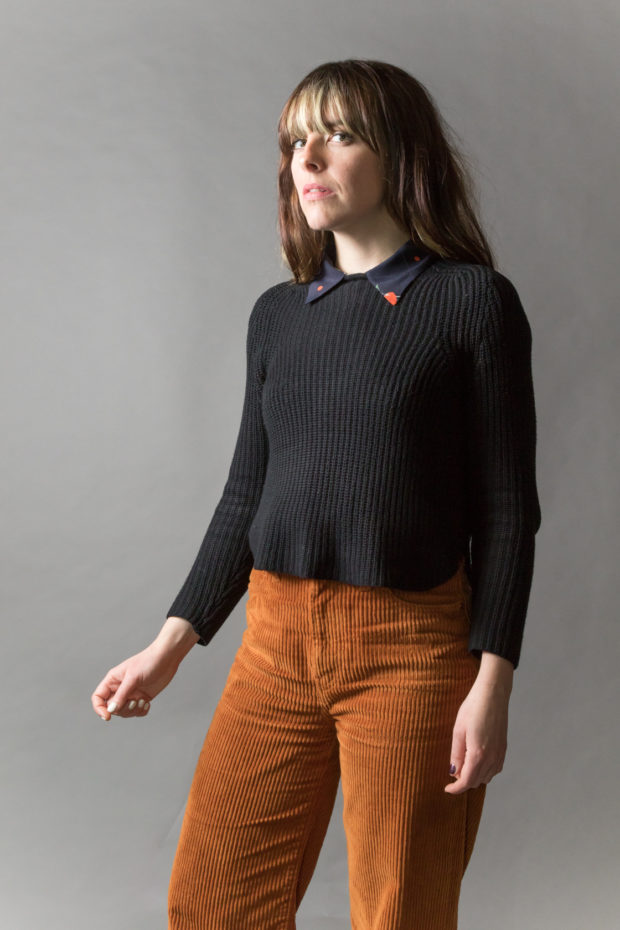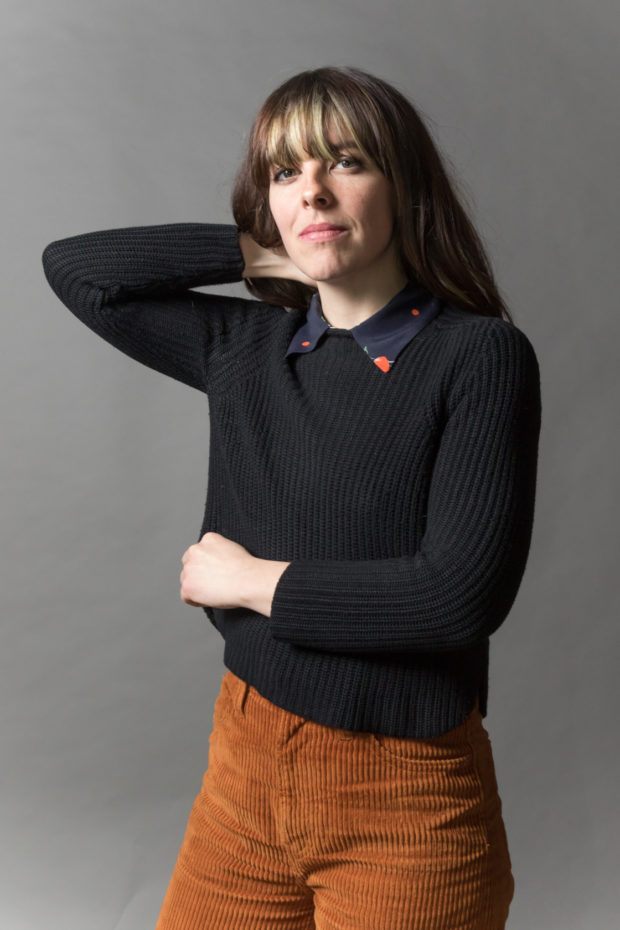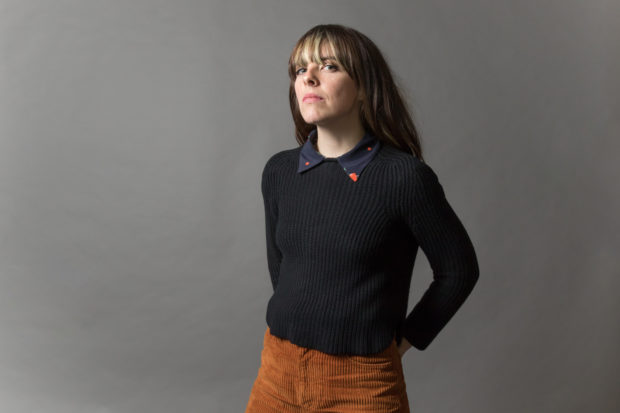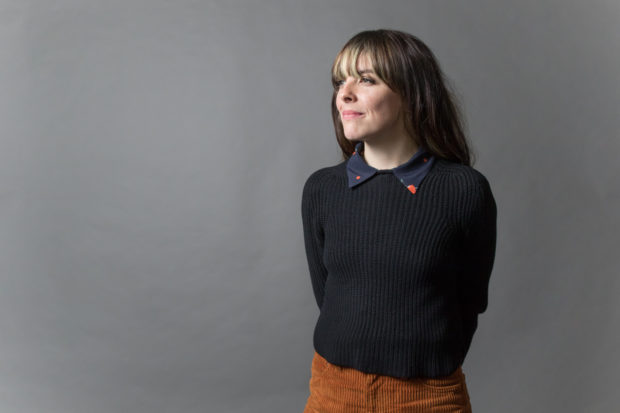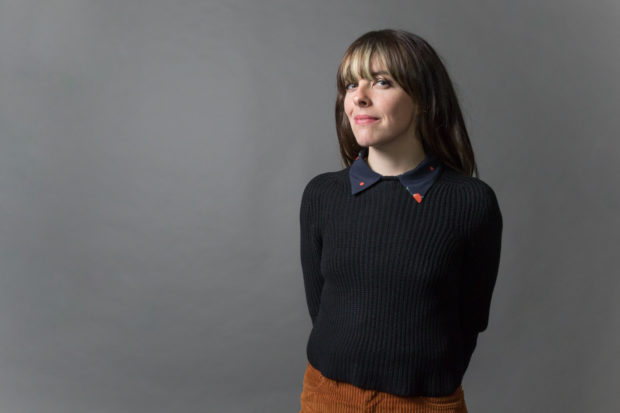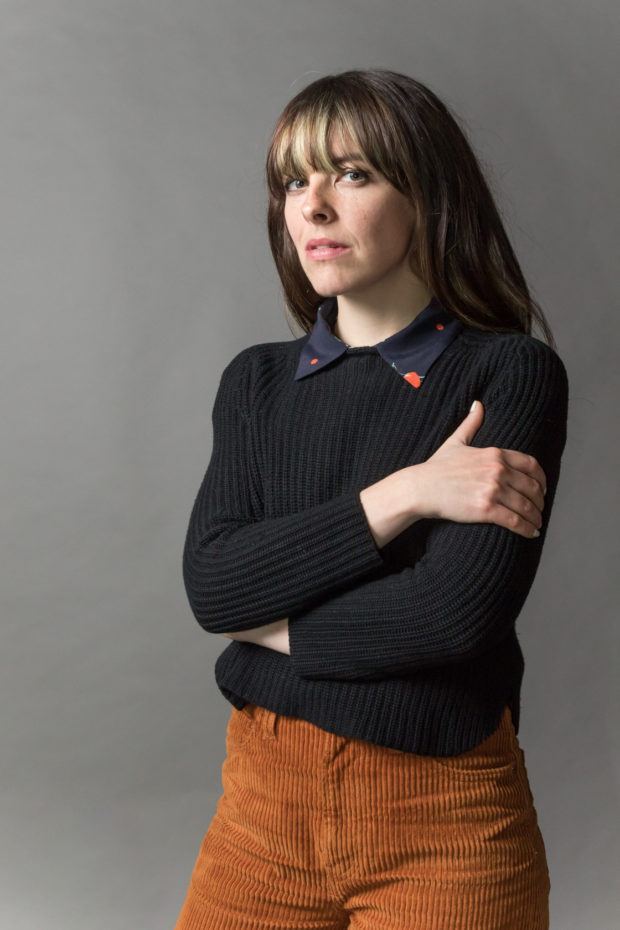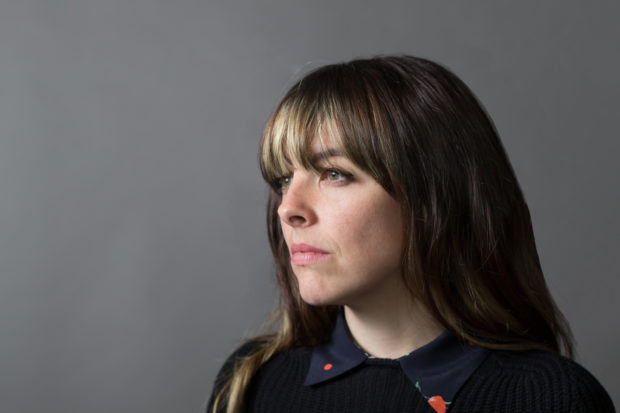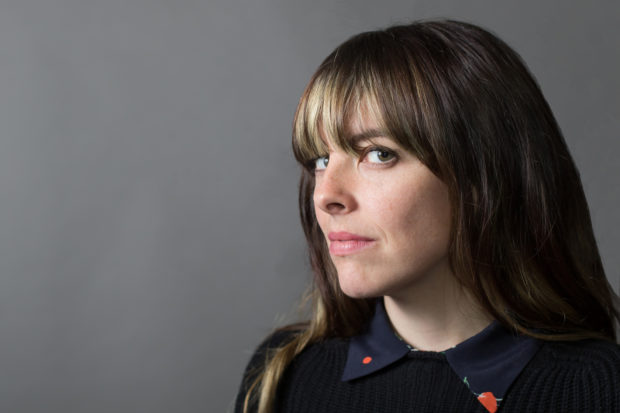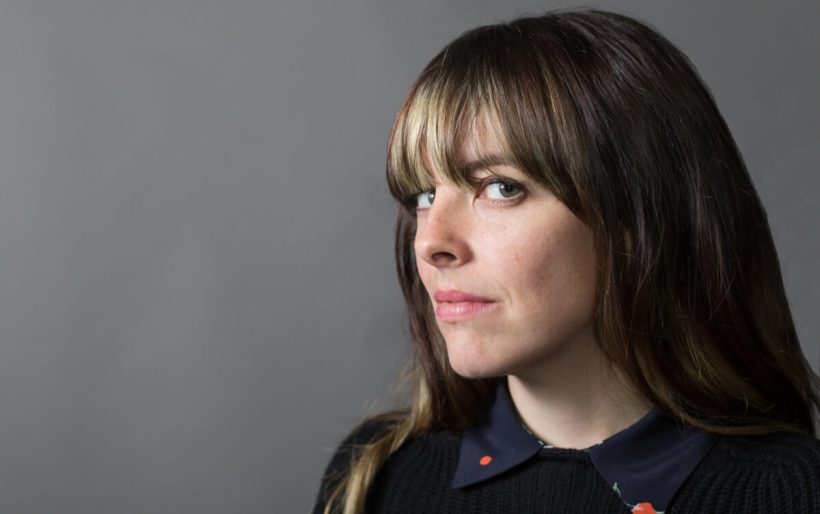
Frances Quinlan | photo by Josh Pelta-Heller for WXPN
The High Key Portrait Series: Frances Quinlan
“High Key” is a series of profiles conceived with the intent to tell the story of Philly’s diverse musical legacy by spotlighting individual artists in portrait photography, as well as with an interview focusing on the artist’s experience living, creating, and performing in this city. “High Key” will be featured in recurring installments, as the series seeks to spotlight artists both individually and within the context of his or her respective group or artistic collective.
After nearly a decade-and-a-half fronting what would become one of the most well-known indie bands out of Philly, Hop Along, singer-songwriter Frances Quinlan will release her first solo record, Likewise, on the 31st via Saddle Creek Records. The album finds Quinlan’s choice of instrumentation shifting, bringing synth and strings to the front, and her approach to arrangement and production has evolved as well. But it’s a return to form of sorts as well. Quinlan launched Hop Along on her own, under the name Hop Along, Queen Ansleis, with the 2006 freak folk record Freshman Year written as a teenager in the Philly suburbs, before expanding the project to include band instrumentation and collaboration.
Reflecting on her evolution as a musician and a songwriter for this interview, Quinlan is quick to emphasize the importance of her main influences: the pioneering women in music she looked up to most, and the supportive siblings who introduced her to them. She also gave a sort of extemporaneous tour of the last 15 years’ worth of Philly’s DIY music scene, remembering the venues she played and the artist community of which she became a part here.
Read our conversation below, and listen to Likewise, streaming via NPR Music. Frances Quinlan plays WXPN’s Free at Noon concert on Friday, January 31st — RSVP for tickets here.
This interview has been edited for length and clarity.
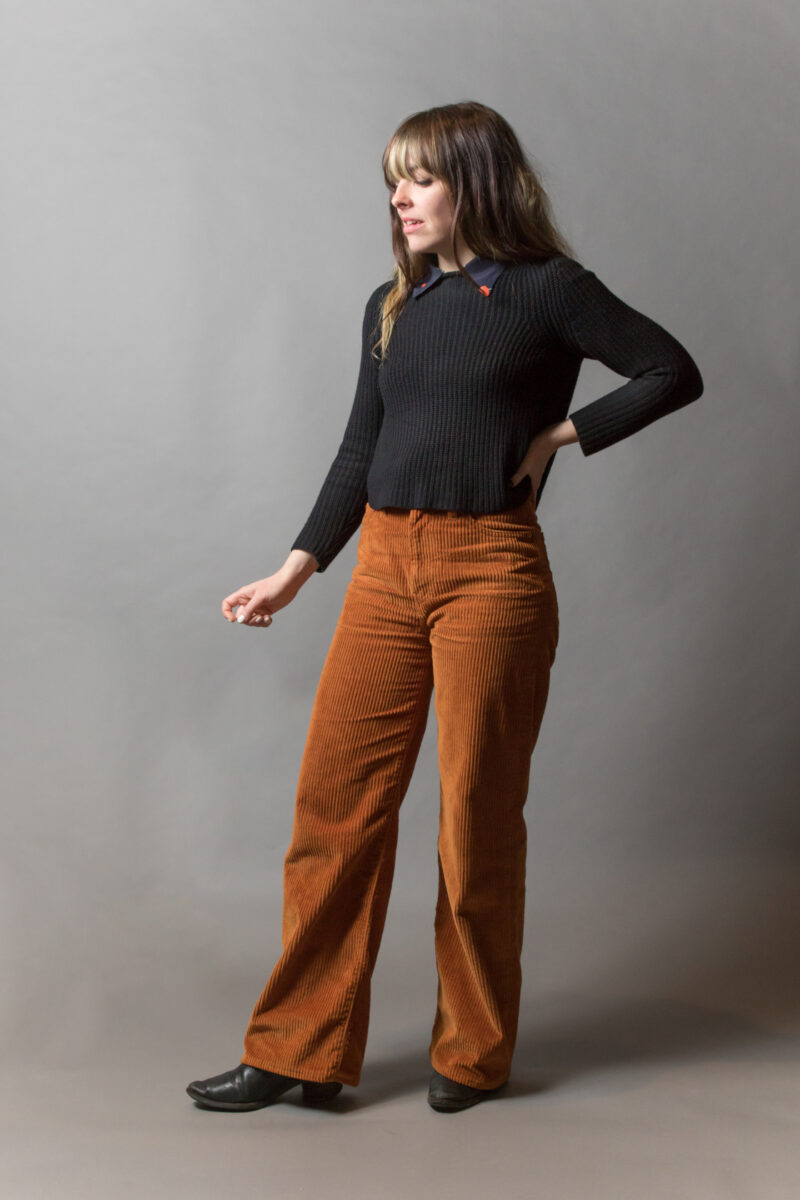
The Key: You said you grew up in North Jersey and near Quakertown, and went to Boyertown High. What are the first things that come to mind when you think of High School?
Frances Quinlan: I remember coming to Philly! Mark — my older brother, and the drummer of Hop Along — he would drive. He took me to my first Philly shows. The earliest ones would have been Warped Tour, which was I guess technically in Camden, in the parking lot of the once Tweeter Center. Good times. We watched Thursday play in a tent while everyone was going to see AFI on the big stage. I must have been 14. After that, my first major show, and a big formative show I would say, was at The Trocadero when I was 15, and that was Sleater-Kinney. The Yeah Yeah Yeahs were supposed to support, but Karen O had bronchitis or something. I went with Mark to a bunch of shows, mostly with a hardcore vibe; we came to the Troc again and saw Poison The Well and From Autumn To Ashes. I was there because Rufio was playing, and I liked Rufio, and also Rise Against. I saw so many great shows there — Ben Kweller with Death Cab, I saw Daniel Johnston there when I was in college — tons of shows at The Troc. Bright Eyes too, that was a big one. Willie Mason opened, and I was chattering through his set like a fool, and I heard his music later and it was absolutely beautiful.
TK: How do you remember that, that you were talking through his set?
FQ: Well… I went to this program that doesn’t exist anymore called the Governor’s School of Art, it happened in Erie, Pennsylvania, and I went for creative writing, but it was for all sorts of art groups – music, theater – and their performances were the most respectful I was ever expected to be at a show.
I was about 17, and it was huge because I met a lot of young people who were far more dedicated than I was to their craft. I was one of “the art kids” in high school, but my high school was very sport-driven, as a lot of schools are. And the art wing was all the way off in the corner. It was definitely like they were making a statement; my one English teacher mentioned that: “they really want to put you guys as far from the rest of the school as they can.” So when I went to this place, a lot of kids from magnet schools were attending — they had already drawn nudes, I’d never drawn a nude before.
I was introduced to a lot of music there, too. That’s where I first got into Belle & Sebastian, that’s where I first heard Bright Eyes and Rilo Kiley. I thought I was cool, and then I went to this place where everyone was far more cool and developed in their craft than I was. It was humbling. But we’d go to these performances, and you’d be expected to watch this 17-year-old rip the most amazing cello solo, and you’d sit there absolutely quiet. And that kind of taught me appreciation of performance. But I still left a self-absorbed teenager for a few more years, and into my 20s. So I do remember my bad behavior as a result. That was a silly thing to do! I had nothing to say, why was I talking?
TK: As far as your memories of being a student, wanting to be an artist back then, what comes to mind?
FQ: Governor’s School was a big one. And one of the most amazing mentors of my life was my art teacher in high school. Her name was Ms. Wagner. She’s the one who told me about Governor’s School, encouraged me to apply and I got in, and she’s also the one who took me with her when she got her MFA. She went to Moore College for her undergrad, and she went to MICA in Baltimore for her MFA, and she invited me and a couple other students to come along for the graduation ceremony. And I went and fell in love with the school, and I wanted to live in Baltimore. So she was a huge part of me going to school there. And my mom, too! It’s so important to have adults encourage you, and tell you you’re good at something, even if you’re not. I mean, not to instill delusion, I’m talking about little little kids. You know, I drew all the time, but I’ve seen some of those drawings, they’re not very good. I wasn’t “advanced,” I just really liked it.
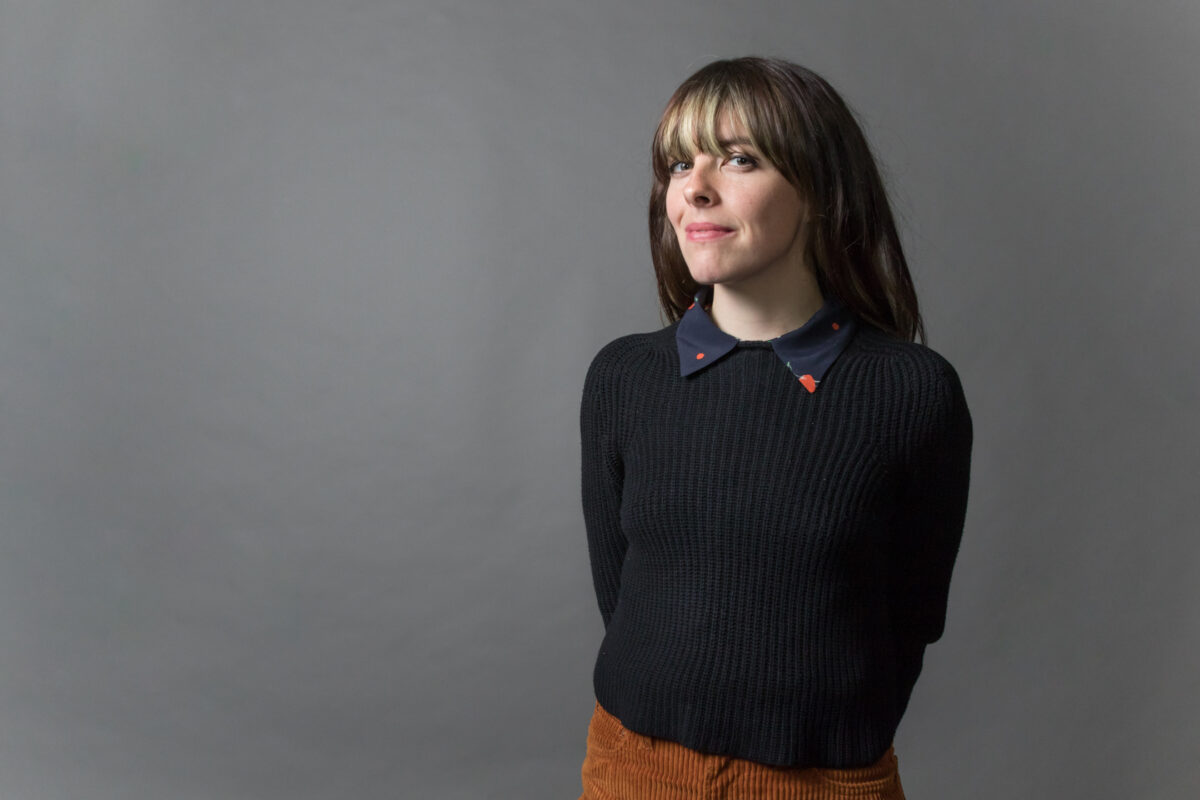
TK: To get encouragement, so you’re not down on yourself from a young age.
FQ: Yeah! My mom told me from a young age, “you’re an artist.” She saw that I enjoyed it immensely, and she took it seriously. And then to have a teacher do the same, and to tell me I could have a career. So I went to MICA to get a BFA, and I went for painting with a creative writing minor.
TK: Were you already playing music at that point?
FQ: Yes. I started playing in a project with my oldest brother — there’s Mark, and then I have some step-siblings, and Andrew is my oldest brother — he saw my interest at a pretty young age in performing and singing. He got me The Miseducation of Lauryn Hill, he got me Living With Ghosts by Patty Griffin. That album had the first song I ever learned to play, “Every Little Bit,” ‘cause it’s really easy. And it was the first home recording I ever heard, it’s just her in her apartment. It sounds great, actually, it’s very crisp. But he got me into her, got me into Ani Di Franco, he got me Fiona Apple’s Tidal. He kept bringing me records with women on them. We were in a project together, we were called The Seven Year Difference, because there’s seven years between us. And we’d play at this place Cosmic Corner Coffeeshop, it was right around the corner from the high school, a basement. I think it became a Curves later. There are some humbling recordings of me singing Patty Griffin songs; I think I also sang a Sheryl Crow song and Andrew played drums. But I started playing guitar when I was 16, that’s when I started playing on my own.
TK: Were you writing at that point, too?
FQ: Yeah, I started to. I was writing songs before that, and he would figure them out. Which is incredible, he would just hear what I was doing and figure it out on guitar. I was writing before I was playing. I picked up a guitar when I was 13 and was like “woah, this is hard.” I was such a brat — I begged my dad for an electric guitar, and he got me one, and then I started playing and was like “oof, this is difficult.” So the first guitar that made sense was an acoustic one, but the action on that was crazy. But I really wanted to learn that Patty Griffin song…
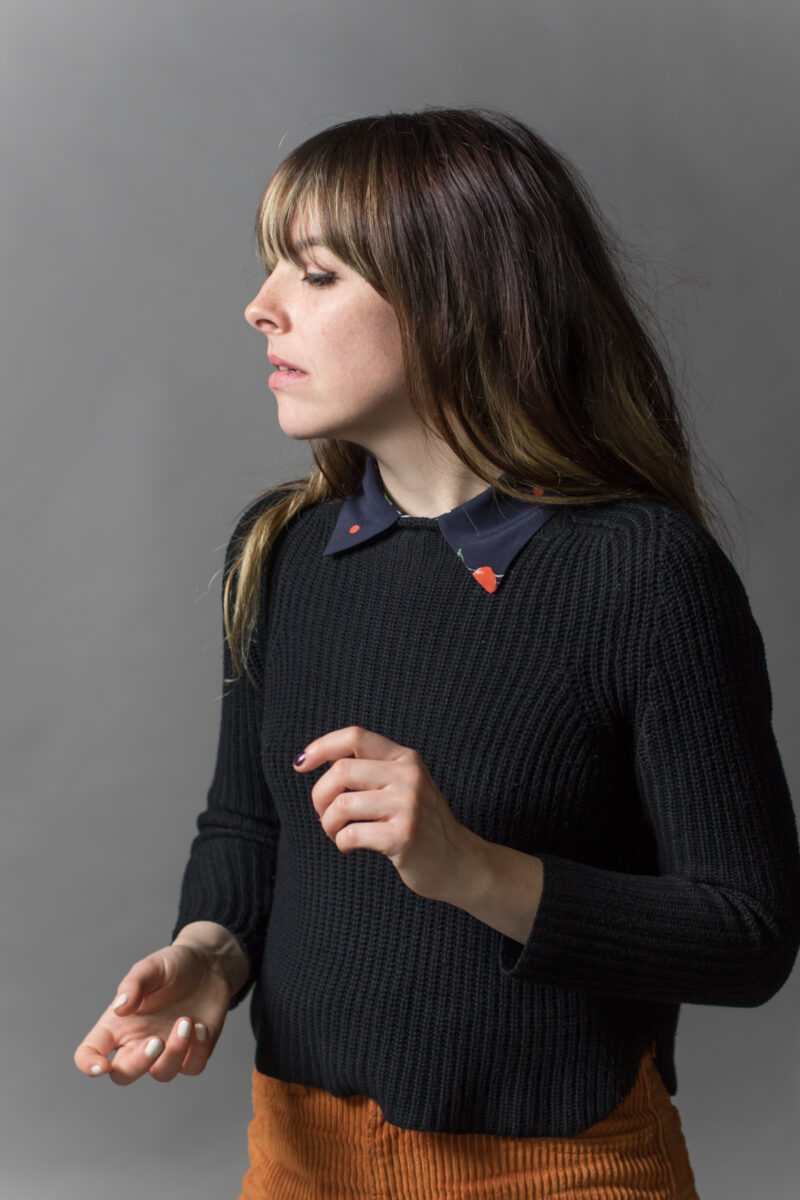
TK: So your first shows were at Cosmic Corner. How did you break into the Philly scene, then, playing out more or playing with different artists?
FQ: When I was in High School, I would go to The Point on Tuesdays, and they had open mic night. I’d get there as early as I could, but often times I’d be way in the back of the line. I met a few Philly musicians that way; one in particular, who’s no longer with us, Damien De Rose of Peasant, one of the first people to support me musically, a really sweet guy. But I’d put my name in, I’d be number 30, I’d watch everybody play the set they play every week, and then the host at the end of the night would decide — really out of the kindness of his heart, because it’d go on and on, it was a long open mic — but much later I’d play, but I came enough times that he was like “we’ll get you in.”
TK: Normally later is better, though, right? Or did the crowd wane?
FQ: But I wasn’t very good! [laughs] I was really working it out. That was previous to my first full length that I made myself, or rather partly myself. But it was really rough, playing covers and stuff like that.
Later, I got into playing shows through MySpace, and the punk and hardcore scenes. There was Daniel Shea, he would book shows at Charm City Art Space in Baltimore [when I was at MICA], and I think my first DIY show was there. And the first person to find me outside of my school mates, cause I went to school with Daniel Shea, was Mattie Canino of RVIVR. They were in a band called Latterman from Long Island, and so incredibly supportive. They set me up a show at this place called the Hobo House in Long Island, which is where I met my friend Dom Angelella, who is from Baltimore but went to school in Philly; our paths crossed in the most funny of ways. But from that punk scene, I met so many people. And then my brother was in a hardcore band called Hey Hey, and we met this other band called Make Me through Hey Hey, and I met Dan Scrizzi, who was moving into a place called Big Mama’s Warehouse. He invited me to move in, and the rent was so cheap, but I remember thinking “Oooh, over $300. I’m not made of money!” And then Mark told me I could live in his basement for like $100-something a month, the only stipulation was that he could play video games whenever he wanted.
But I loved Baltimore and in the meantime I would play shows in Philly here and there. I met Allen Dodd, I came up from Baltimore and had to go to school the next day, and I came up and played at a place called the Veggieplex: me, Hey Hey, Little Light, Fake Problems, and Algernon Cadwalader played a show together in 2006, and I didn’t really officially meet any of those people, and did not know I would become very close friends with [Hop Along and Algernon Cadwalader guitarist] Joe Reinhart later on down the road, so It’s funny how that shapes up.
TK: Where was Mark living at the time?
FQ: Mark was living near Jefferson, he was living at 9th and Clinton. He went to Temple. But I didn’t even want to move here, I was worried that this was too close to home. I wanted to branch out, cause I’d already been living in Baltimore which was four hours from home, so in my head I had to move even farther away, and change and evolve
But Mark invited me, and what happened with Hop Along — it started out solo, it was a freak folk project, but I always wanted to play with a band. Especially since I started touring, and going to more and more shows, and playing on shows with bands — they have the best time together, they have inside jokes, they have banter, it’s very energetic, the crowd responds to bands a little more enthusiastically to bands than solo performers…
TK: So that was your dream, to have stage banter?
FQ: Yeah, exactly! And we have too much of it now. [laughs] So I would go on tour solo on school breaks, I went twice with Dom, and once with another friend. And as I was graduating, Mark’s band was breaking up, and Dom and I had been talking about jamming together too. And it just made sense, why don’t start playing together? So I brought songs I’d been working on over — there’s one song called “Cow Eyes,” another song called “La Strada” — and we got together and started working that out. Dom was playing with us at the time, but Dom had solo work he was dedicated to and another band he was in.
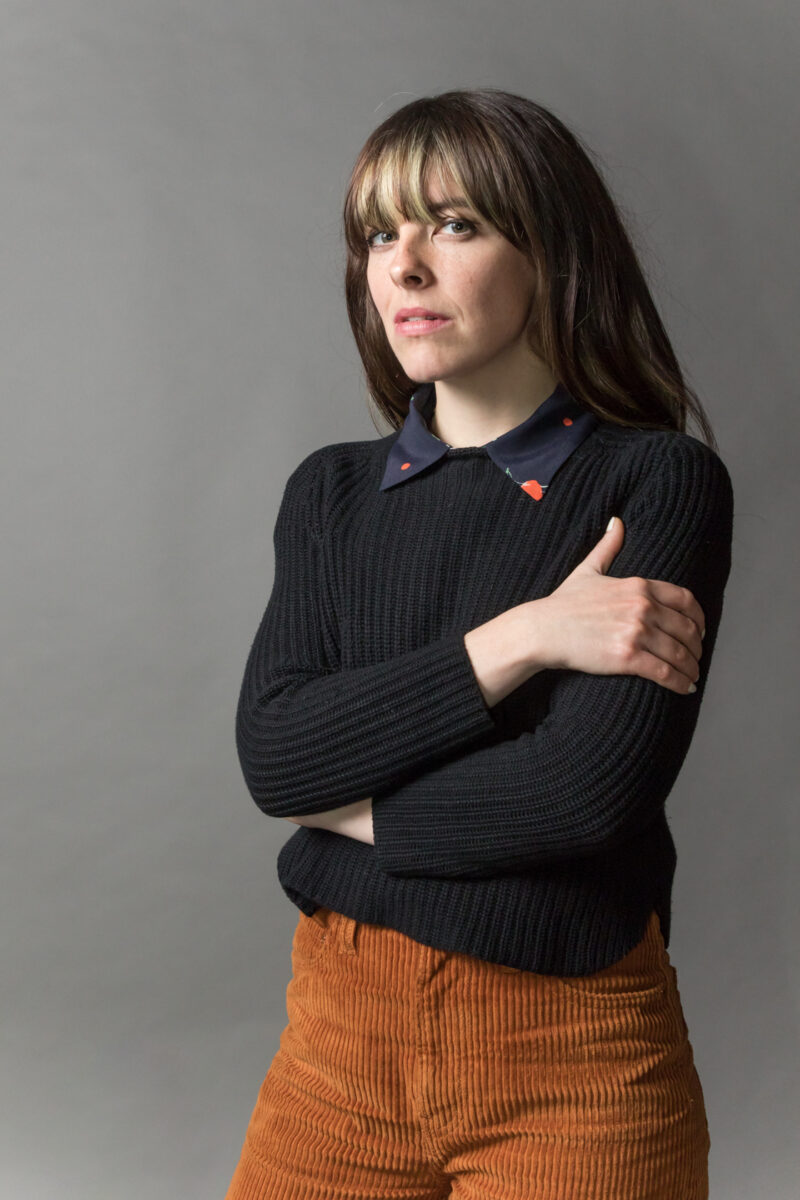
TK: Where were Hop Along’s first band shows, then, in Baltimore?
FQ: No, our first show was at The Khyber, right before they stopped doing shows. I hear they started doing shows again, which is crazy. But yeah, we played 2008 at The Khyber, I think that was our first show as a band. My mom was there, my oldest brother, my cousin. I think Alan Dodd came, bless him. And whoever was already there at the bar.
TK: Were you nervous? How do you remember the show?
FQ: Oh yeah, I was nervous. There’s photos from that show, too, I had my hair all curly, did myself up, wore a skirt. But I was very nervous. Especially playing in front of your family, you want to be good. But everyone was very encouraging. We’ve just been so lucky, I’ve been so lucky. I’ve gotten better, but in my developing years when I certainly had a lot of work to do, I had friends who would come to Cosmic Corner every Tuesday to support me and hang out. But that’s a big deal, which I didn’t appreciate enough at the time, so thank you to those folks. And all those DIY shows. Hop Along didn’t really enter the “commercial music realm” or the “music industry” till I was almost 30. We got signed when I was 27, I started when I was 18. I sent a demo to Saddle Creek and they sent me a postcard to say thank you. But [Bright Eyes’] I’m Wide Awake, It’s Morning had just come out, or was about to come out. So they were busy. They had a lot going on.
But they were the only one to respond, I’d sent my demo to Saddle Creek, Jade Tree, Arts and Crafts, Merge and that’s it. I was like, “that’s enough.” But I didn’t hear back, I put out Freshman Year myself, I called the label Blue Moose. I hand made all the sleeves, I cut them up and glued them myself. So if you have the original Freshman Year CD with the cover – I mean, I don’t know if people were bootlegging that stuff — but it’s all hand-glued and hand-made by yours truly, and it probably took forever to get to you too, and I apologize. I painted everybody’s envelope that I mailed the CDs to, so they were so late, but they didn’t care, they didn’t know they were getting a painting. Made with love!
TK: So what’s your favorite music venue to play in Philly as Hop Along?
FQ: I was sad to see The Troc go. We only played there once, but I had so many awesome experiences being there. I went to Skeletor Karaoke, that was really fun — I got gonged — I saw many formative shows there, so it was sad to see it go. Union Transfer is always fun, the Church is a very fun, all-ages, inviting space, it just gets very hot. I remember getting so hot when we played for the Get Disowned album release party. My poor mom, my friend Tiff set up a fan for her that night. And it flooded, there was a crazy rain storm. I remember Mary Lattimore had to get her heavy, heavy harp up on a table, Mark had to move his drums. I’m just happy anyone came because rain really keeps people away, especially in Philly. Maybe not as much in Portland, it just rains all the time and they’re not as against it, but in Philly it really does affect attendance.
But I don’t really have a favorite, I’ve played so many places. The Mann was great for us, opening up for Dr. Dog, and Mac Demarco, and The Front Bottoms. The Dell’s a beautiful space, that was the most beautiful sunset I’ve seen in Philly at a show we’ve played. We’ve played Electric Factory, we’ve played The Troc. We never played the TLA, but we’ve played Johnny Brenda’s many times, and I used to work there, so that’s also a very special place for me. And also PhilaMOCA, Golden Tea House — I played there solo. A lot of houses.
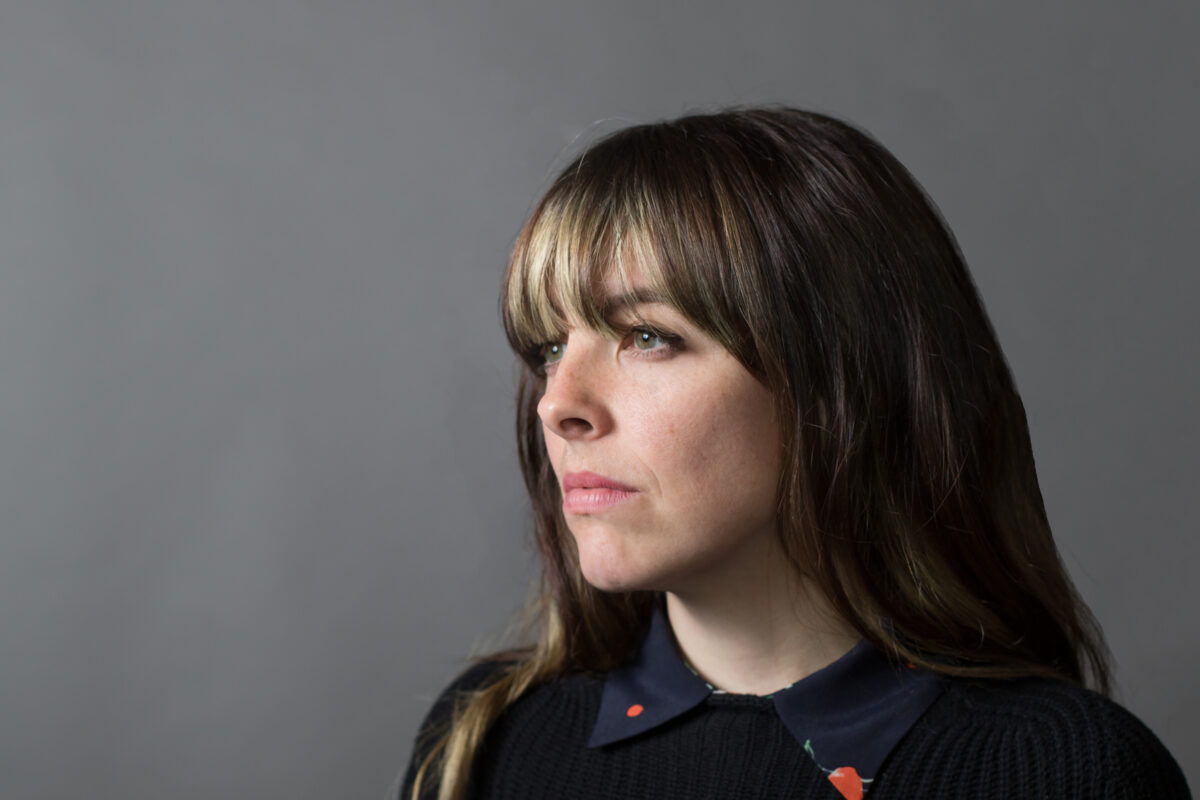
TK: I want to ask about Philly, especially with you having lived and performed in Baltimore and being able to contrast. What do you feel about the Philly music scene and arts scene is a benefit in terms of being able to create art here?
FQ: I haven’t been in Baltimore for a very long time, but when I moved to Philly, it reminded me of Baltimore. Just this very do-it-yourself, if-you-want-to-put-on-a-show-you-can attitude — cause in Baltimore you were having shows at The Copycat, and Dan Deacon would set up shows at a warehouse space, and then when I moved to Philly, Big Mama’s was just starting the year I moved to Philly.
Philly also doesn’t feel particularly competitive to me. Certainly there can be healthy competition anywhere — I would see bands and think “Oh my god, I gotta work on my stuff!” I would see lots of inspiring stuff. But when I moved to Philly The Ox was starting up, The Ox was a warehouse space, and they would have big shows. Lightning Bolt played there, I saw Future Islands play there in 2009 and 2010, and people my age set that show up.
But I was really fortunate, I had already had my brother who had some friends in the hardcore scene, and through them we met people from the punk scene, we met Joe Reinhart who lived at Big Mama’s at the time, and right away we got along so well. Joe’s just one of the funniest people I know. And hearing his band, I thought they were fantastic, and he’s a killer guitarist. I was lucky to have a sibling already in the mix, to tell me where to hang out.
When I met everybody at Big Mama’s Warehouse, that was such a big thing for me, meeting those folks, because they all were musicians and artists, they had a screen printing studio in one side of the warehouse, which at one point I screen printed Hop Along shirts there. Greg Labold taught me how to screen print, and with his assistance, I would print my own band’s merch there. And that’s where we recorded Get Disowned. And then there would be nights where we’d all be hanging out, being goofy, and we’d just go in the studio. There’s a photo of me playing drums. I’m sure it’s terrible, but I had a great time. It had nothing to do with success or any ambition but enjoying the space we had and the tools at our disposal to create. It was so cool that they let me part of that, all those folks at Big Mama’s.
TK: Do you find anything particularly frustrating about being in Philly as an artist?
FQ: I want to be careful when I talk about gentrification, because I can’t help but worry that I’m part of the problem. I’m not born and raised in Philadelphia, I moved here in 2008. So for me to complain, I’m not sure how much I contributed to the issue of the high rises going up…
I’m lucky because I live on a block that has a lot of people born and raised, and one person grew up on that block. And that’s really nice to be around. I only began to appreciate this community recently, to be honest. I went through my 20s really thinking about my work, and my ambitions, and those are still obviously a big part of my identity for better or worse, but I am finally appreciating what a unique and what character this city has.
TK: Do you have a Philadelphia artist who was most inspiring, or who was a mentor for you?
FQ: My brother is a big one throughout growing up. I think Joe is one, I met a lot of people through Joe, and his generosity, you can really sense it. He’s really open to everybody, I love what [his studio] Headroom is doing, bringing in young bands there and making great records, and they bring interns in and really show them the hands on experience of making records. But we worked together almost immediately, so we’ve been more peers, but he’s a colleague I really admire. And Tyler too, Tyler moved to Philly and learned bass for our band, and now he’s one of my favorite bass players; he played on “Rare Thing,” he’s killer.
And I met people at Johnny Brenda’s and they were all sweet to me, Chris Ward is lovely, he [just finished] his last year at Johnny Brenda’s, which is wild to me. And there are bands from Doylestown, there’s a band called Illinois, and Chris Archibald from Illinois was a major person for me too. He produced a couple songs on my first full length, Freshman Year. He did “Bride and Groom,” he did “A Drummer’s Arm”, he played drums on two songs too, “Cactus” and “Workers.”
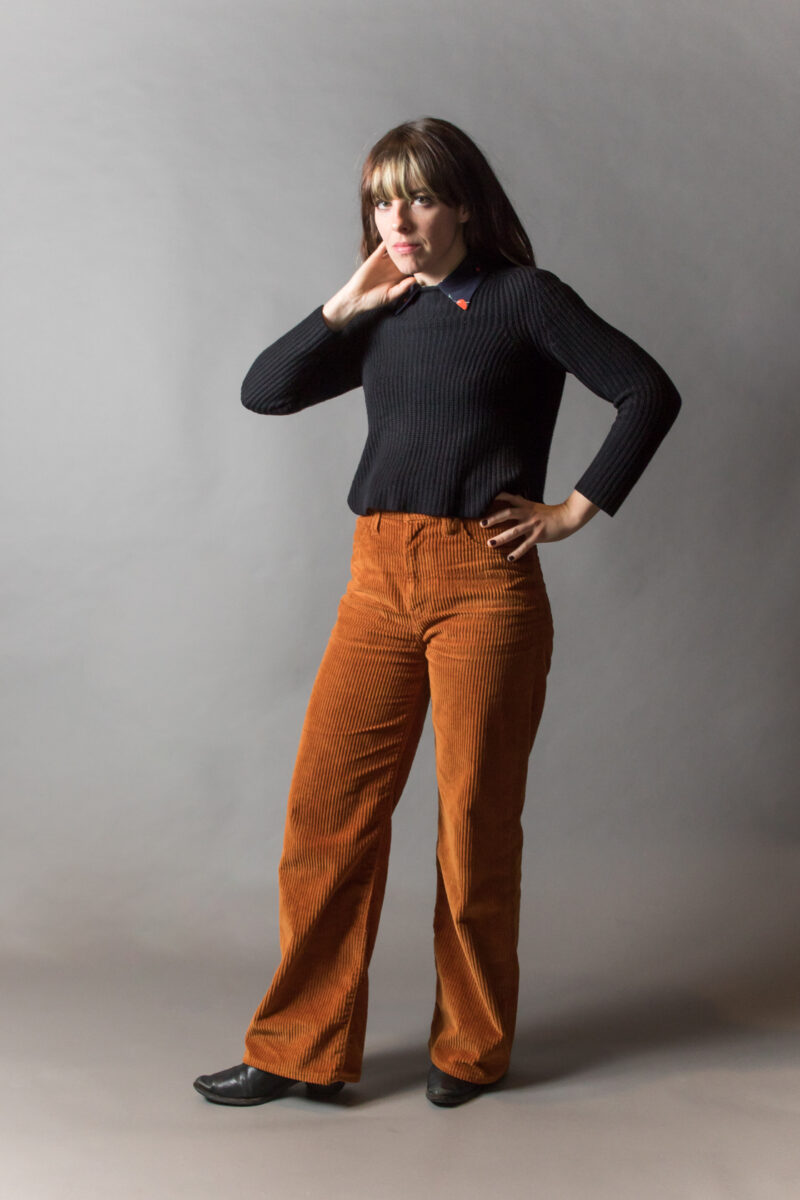
TK: Tell me about the solo record. What was the drive to go back to being solo, and since you were Hop Along initially as a solo artist, what makes you want to be Frances Quinlan as a solo artist?
FQ: It’s not too different. For me, the writing process is pretty much the same, it’s the arranging and recording that’s very different. Writing I tend to do by myself, I just need time. It takes a long time to form the chords I want. I’ve been so much more interested in the written, lyrical aspect for so long, and I’m beginning to appreciate the musical aspect more.
But Hop Along has gone through this major transformation. Yeah, it did start out solo, but as soon as I began playing with other people it became something else. The people I’ve gravitated towards playing with aren’t people that have the same exact tastes as me. Mark and I have very different musical background, and he was one of the first people I started playing with, he and Dom. And even Dom, he had more of a punk background when he started playing with us. But then he was only with us for a couple years. I think 2010 or 2011 was when he stopped.
TK: Well he had DRGN King, which was very indie rock.
FQ: He had punk and then classic bands. But we both liked The Microphones, we both liked a number of artists. We definitely had stuff in common, but also he was really into bands like Leftover Crack and stuff. He’s way cooler than me, he was going to house shows when he was way younger. But that was when we first started the band, and when Tyler joined the following year, Tyler and I have a more similar background, we both loved Bright Eyes in high school. We all have very different musical backgrounds, and so it took us a long time — it took me a long time — to learn how to use those different backgrounds to our strengths and bring it to the group. The good news is it was always interesting, always. Songs that I brought in never came out the same as they started. “Tibetian Pop Stars,” I had this melody, and Mark was in the basement playing this beat, and I started playing to that, and the beat’s a huge part.
TK: You mentioned writing songs before you knew how to play guitar; did picking up guitar inform how you write?
FQ: Probably. I would write what I could play, I would sing what I could play, but it’s really hard for me to say what starts first. Generally I’d say it starts with a guitar at this point, and then I have a phrase. Because vocals, it’s really hard to mold music to words. I feel like there’s a lot more forcing that needs to happen in my case. And while of course I still do agonize over the lyrics, for me, music tends to pull the first phrase out, and I can then work around that. But yeah, I have a full skeleton of a song, I take it to the band. We edit, we re-edit. Someone writes a new part and that’s better than the vocal arrangement I had, so I would change it to that. A number of songs went that way. For Bark Your Head Off, Dog, “Somewhere a Judge” started off very different from how it finished. It was a different vibe completely when it started.
TK: Is that the kind of song you would do again acoustically? If it started so differently, would you ever consider doing it the way it started, versus the way it ended up?
FQ: That’s one of those songs that I’m not sure would sound as strong acoustically. I mean, they could all be played on the acoustic, they were all written on the acoustic, initially, but some would sound more compelling than others; those guys bring so much to the table. We never tell each other what to play. We’ll talk about the mood and how it should feel, but everybody has great instincts. For that record, that was when I feel like I really learned to communicate what my instincts were. Before that, I always kind of struggled for a long time for expressing the feeling I wanted to create. It’s a hard thing to get your hands on, and explain, when you’re not even sure yourself. What is moody? Sometimes moody doesn’t mean playing a song really heavy, it’s just amazing all the different kinds of paying that can evoke sadness or joy. The spectrum of emotions.
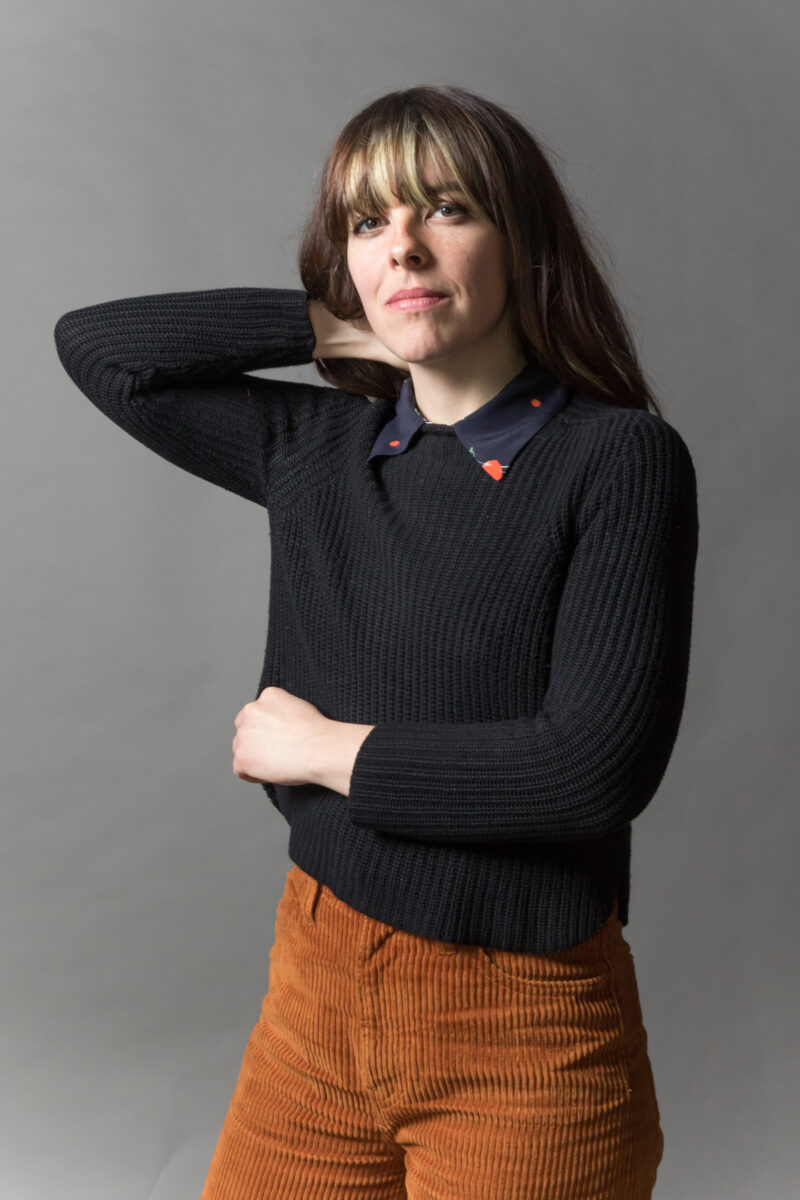
TK: Do you get to be a perfectionist about how it sounds? Like, do you start thinking about how this is going to be part of the music forever…
FQ: Oh, I would certainly say I’m an overthinker. I get in my own way a lot. That was the nice thing about doing the solo project. I wanted to try to get out of my own way a little bit. And also not worry so much about things being perfect. I mean, I play drums on a song. Goodness knows I am not a percussionist. But I play the hell out of a tambourine, if anyone’s looking.
TK: You cover a Built to Spill song on the new record. How do you decide as a music fan, of the millions of songs out there, which songs you want to cover?
FQ: That one’s just the most fun to play. I’ve been playing “Carry the Zero” live for a couple years I think. I wanted to cover it for a while, I was trying to. The guy I was dating at the time, we were trying to cover it together, and it just wasn’t working, I couldn’t find my range. And then it just clicked one day. And after that, I wanted to sing it all the time. That song is just a perfect song. And any time you find a cover that actually works, it’s very special. It’s nice that it can feel as natural as one of your own songs. I could never have written that, of course, but it’s nice that it feels so natural to sing it. And so it made sense to record it. Joe and I knew it shouldn’t be a guitar song, because we would just eat Doug Martsch’s dust — he’s an incredible guitar player – so it’s almost all synth. Joe plays guitar on that song, I play acoustic, Joe plays a great killer solo in the beginning and the end. But we mostly stick to synths, I do a vocal pattern. We try to make it different, and I think that’s the best covers are: a reimagining of the song. So that’s what we tried to do.
TK: What’s on the horizon for the record? Are you going to release, tour?
FQ: That’s the plan. I’m going to be working on some Hop Along songs as well, but this is going to be the first time I’ve ever been in a project other than Hop Along. It’s new territory for me, but there will be navigating between the two. I actually want to do some traveling and play some places that Hop Along hasn’t been to. We’ll see how possible that is, but I would love to travel play some surprising spots.
Frances Quinlan’s Likewise is out Friday, January 31st via Saddle Creek Records, and she plays WXPN’s Free at Noon Concert that day. RSVP to the show here, and pre-order the record here.
